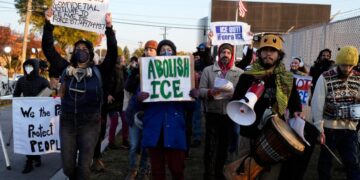By Nancy Thorner and Ed Ingold -
The passing of Justice Scalia on Saturday, February 13, while a guest at the Cibolo Creek Ranch luxury resort in the Big Bend region south of Marfa, is a tragedy for the entire nation.
This commentary, "What Scalia Taught Us", by Paul J. Larkin Jr., director of The Heritage Foundation’s project to counter abuse of the criminal law was published on the day Scalia's death was announced and expresses the esteem and high regard held by many upon hearing of his death:
For some, it is the painful loss of a husband or father. For those who knew him, it is the loss of a good friend. For law students, it is the loss of a justice who wrote opinions with rigorous analysis, clarity of expression, and at times an acerbic wit.
For conservatives, it is the loss of a standard-bearer and icon. For liberals, it is the loss of an opponent who always fought hard but fair.
For those who never had the opportunity to know him, it is the loss of one of our greatest legal minds, of a judge and justice who had made, and will continue to make, legal history. And to those who were privileged to know him, it is the loss of a wonderful human being.
Larkin goes on to note that 100 men and women have been justices of the Supreme Court. While Joseph Story, Oliver Wendell Holmes, Hugo Black, Earl Warren, William Brennan, and William Rehnquist will be remembered for moving the Supreme Court in one direction, thereby establishing the Supreme Court as one of the most powerful institutions in our nation, fewer justices have changed the course of the law. Antonin Scalia, along with John Marshall, were cited in the latter category of judges.
Scalia voiced disapproval of a Constitutional Convention
In a speech to the Federalist Society in Morristown, N.J., Scalia presented the following reason why America’s basic freedom has endured for more than 200 years: "It is the Constitution, not bill of rights, makes us free." Why? Because it is the Constitution that imposes structure upon our government. Scalia considered the 7th Amendment — passed on April 8th, 1913, when Woodrow Wilson was President of the U.S., and which provided for the direct popular election of U.S. senators — the most profound and significant departure from our nation’s constitutional structure, contending that it removed a key plank of the constitutional structure the framers put in place to protect federalism and state interests. Furthermore, at a time when conservative leaders and groups are calling for a constitutional convention (Con-Con), during the question-and-answer session Scalia had this to say about whether such a convention would be in the nation's interests: “A constitutional convention is a horrible idea. This is not a good century to write a constitution.”
If you look at issues which have divided the Supreme Court on a 5/4 basis, it is clear that all parties are not reading from the same page, to wit, the United States Constitution. This is why the death of Antonin Scalia constitutes a grave threat to our liberty. Scalia was the bastion of “originalism,” which interprets the Constitution according to the founding father’s original intent.
Cases presently on the docket could alter American life on many issues, especially in closely divided cases where Justice Scalia was expected to serve as a lynch pin of a conservative majority. With 8 justices a majority decision would be 5-3 rather than 5-4, and if and when there’s a 4-4 split, the lower court’s decision is upheld. But there’s an important caveat to that latter point: that decision isn’t automatically considered legal precedent.
The potential replacement of Justice Scalia by a liberal judge would shift the balance of power away from individual rights to collective rights in general, but the right to keep and bear arms in particular. Loss of these freedoms would be very difficult to recover, if ever. A liberal court would serve to keep liberals in power throughout the government by denying rights to those who oppose them. Among them, the right to support candidates by word and deed under the First Amendment.
Cases remaining on Supreme Court docket with questionable outcomes without Scalia's voice
Following are eight important cases that remain on the Supreme Court docket and their possible outcomes without the voice of Justice Scalia.
Abortion
In what is considered the most significant abortion case since 1992, this term’s abortion case centers on restrictions placed on providers and clinics by Texas and will again test how far states can go to limit abortion. The Court was expected to be divided along party lines, with Kennedy as the possible swing vote.
Health care
Religious nonprofits, including charities, schools, colleges and hospitals, may have to live with the decisions of seven appeals courts, which ruled against their challenge to the Affordable Care Act’s contraceptive mandate in Zubik v. Burwell. How will religious freedom stack up when pitted against a woman's right to choose?
Unions
Public sector-unions may get a reprieve. What appeared to be an all but certain 5-4 ruling against unions in Friedrichs v. California Teachers Association in regard to "fair share" fees that unions charge nonmembers to cover costs associated with collective bargaining, could end up with a 4-4 decision without Scalia. Labor unions want to hold elections by acclamation in open meetings. They are supported in this by President Obama and the Board of Labor Relations packed with his sycophants. Currently, elections are conducted with private ballots where everybody in the company has a right to participate. Election "meeting," on the other hand, are limited by the size of the hall and subject dissenters to public humiliation or worse.
Affirmative Action
The use of affirmative action in college admissions could now survive a challenge. If so, a lower court decision will remain in place that favors the University of Texas in using race as a factor in admissions.
Separation of church and state
Religious schools could continue to be denied publicly funded grants. Scalia, along with Justices Clarence Thomas, Samuel Alito, John Roberts and Anthony Kennedy had indicated a willingness to accept the argument that banning state lawmakers from funding religious schools, if a democratic majority wants to, would impede the free exercise of religion.
Climate Change
Obama’s Clean Power Plan could return back to the hands of the D.C. Circuit Court. One of Scalia's last official acts as a justice was to deliver a large dent in Obama's climate legacy by providing one of five votes to stay the Clean Power Plan, which regulates carbon emissions from power plants. A 4-4 ideological split on the Supreme Court raises the stakes for the more liberal D.C. Circuit's eventual decision on the Clean Power Plan.
Immigration
Scalia’s death may not have a big impact on one of the most significant cases the court has agreed to take up: a challenge to Obama’s latest round of executive actions on immigration to be argued in April, unless the administration can win the vote of Justice Anthony Kennedy or Chief Justice John Roberts.
The Second Amendment
Last but not least, Justice Scalia was the foremost supporter of our rights to keep and bear arms. The Heller decision established that the Second Amendment gave individuals these rights, rather than a collective right. The MacDonald decision applied these rights to supercede state and local law, subjecting these laws to strict scrutiny in most cases. The New York Times expresses this threat in a near joyful manner. “Instead of overruling precedents outright, he said, a liberal majority might hollow some of them out, notably in the area of gun rights. “The five would narrow Heller to the point of irrelevancy,” he said, speaking of the law that said Americans had a constitutional right to keep handguns at home – Eric Segall, Georgia State”
American people must decide Scalia's replacement, via our next president
The Founders faced nearly medieval tyranny in the form of George III, who taxed the colonists heavily in order to pay for his foreign wars, and collected these taxes under force of arms. To make matters worse, colonists were required to feed and house those troops at their own expense. The King and Parliament forbade colonists to do for themselves, rather purchase basic materials like cloth, paper and other items from England, because it suited the King to favor monopolies which he created. In order to silence opposition, it became a crime to publicly disagree with his orders (restrictions which still exist in England and most of Europe). In order to forestall resistance to these draconian orders, he ordered arms and gunpowder seized. Fortunately he wasn’t entirely successful.
We face a different tyranny today, not from a king but from self-serving “liberals,” whose title inappropriately stems from “liberty.” As such liberals (Liberalism) look to government for basic needs, largely as enumerated in Roosevelt’s “Second Bill of Rights. These items include housing, jobs, medical care and wages. If this sounds somewhat familiar, look at the UN’s version of human rights, and before that august body, the Marx/Engles “Communist Manifesto.”
President Obama was entitled to two terms of office, won in free elections. He is not entitled to encumber the nation with 30 years of an unbalanced Supreme Court which disregards the Constitution and rights under God in favor of a worldly fabrication of “rights” which in fact stand in direct opposition to the rights our fathers fought and died for. We are better off living with a dead tie in the Supreme Court until Obama is out of office than subject ourselves to judicial tyranny from the Left.
It would be a tragedy for our Constitution if the Senate simply confirmed an anti-Constitution judge to replace Justice Scalia's seat. Confirming a new judge the year of a Presidential election is unheard of, especially with rampant judicial activism. Democrats would never go along with nominating a Conservative judge if the roles were reversed. It's likewise folly to expect that Obama would nominate a judge other than a liberal one to fill the vacancy created by Scalia's death.
The Constitution does grant a president the right to recommend a Supreme Court appointee; however, the Constitution likewise gives the Senate power through the confirmation process to stop the process, and there is nothing the President and Senate Democrats can do about it to get the president's nomination confirmed.
It must be left up to the American people to decide who the next Judge will be, via our next President. If Republicans in the Senate don't hold the line against an Obama nominee as a betrayal of Conservatism, the Republican spirit and the Constitution, it will likely signal the end of the Republican Party as a viable political party. If there is anger now over the way Republican legislators repeatedly cave in to Democrats, the anger will turn to pure rage and disassociation with the Party if the majority Republican Senate confirms what is sure to be a liberal Obama Supreme Court nominee.







